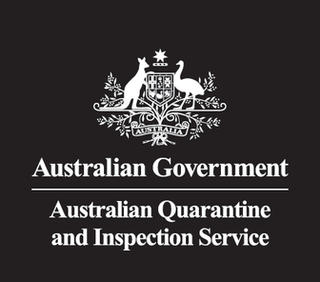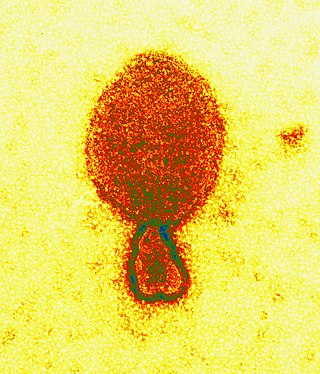The Australian Government Department of Agriculture and Water Resources was a government department that existed between 2015 and 2019, which was responsible for developing and implementing policies and programs that contribute to strengthening Australia's primary industries, delivering better returns for primary producers at the farm gate, protecting Australia from animal and plant pests and diseases, and improving the health of Australia's rivers and freshwater ecosystems.

The Australian Quarantine and Inspection Service was the Australian government agency responsible for enforcing Australian quarantine laws, as part of the Department of Agriculture.
The Ministry of Agriculture and Forestry was a state sector organisation of New Zealand which dealt with matters relating to agriculture, forestry and biosecurity. It was commonly known by its acronym, "MAF".

Hendra virus is a zoonotic virus found solely in Australia. First isolated in 1994, the virus has since been connected to numerous outbreaks of disease in domestic horses and seven human cases. Hendra virus belongs to the genus Henipavirus, which also contains the zoonotic Nipah virus. The reservoir species of Hendra virus are four species of bat within the genus Pteropus native to Australia.
The New South Wales Department of Primary Industries (DPI) was an agency of the New South Wales Government, responsible for the administration and development for agriculture, fisheries, aquaculture, forestry, and biosecurity in New South Wales. The DPI worked to drive innovation in primary industries to improve resilience, productivity and sustainability, and to ensure risks are managed for natural resources, farming and food.

The economy of New South Wales represents a significant proportion of the Australian economy. The economy was valued at A$660.6 billion in 2021-22, representing 30.6% of Australia's total GDP.

The Minister for Agriculture, Fisheries and Forestry is an Australian Government cabinet position which is currently held by Julie Collins since July 2024 in the Albanese ministry.

The Minister of Agriculture is a minister in the New Zealand Government. It was re-created as a standalone portfolio in 2017 after previously existing continuously from 1889 to 1998, and again from 1999 to 2012. The current Minister is Todd McClay.
Department of Employment, Economic Development and Innovation (DEEDI) was the Queensland Government department for employment, economic development and innovation for the state of Queensland. It was established on 26 March 2009. Following a change of Government on 24 March 2012, the department was split into multiple agencies as part of the machinery of government changes.
The Department of Primary Industries (DPI) was a government agency responsible for agriculture, biosecurity, fisheries, earth resources, energy and forestry policy and programs in the Australian state of Victoria from 2002 to 2013.

The New South Wales Minister for Agriculture is responsible for the administration and development of agriculture, fisheries, aquaculture, state forests, biosecurity, and crown lands in New South Wales, Australia.
Biosecurity in New Zealand guards against threats to agriculture and biodiversity, with strict border control measures being taken to prevent unwanted organisms from entering the country. New Zealand is an island nation that is geographically isolated from any other significant landmass. The species that are present evolved in the absence of organisms from elsewhere and display a high degree of endemism. Notable is the lack of land-based mammals, except for two species of bat. Indigenous species are at risk from population decline or extinction if any invasive species are introduced. The Ministry for Primary Industries (MPI) is the government department in charge of overseeing New Zealand's biosecurity. The Biosecurity Act 1993, which was a world first for biosecurity control, was passed to "restate and reform the law relating to the exclusion, eradication, and effective management of pests and unwanted organisms".
National biosecurity in Australia is governed and administered by two federal government departments, the Department of Health and the Department of Agriculture, Fisheries and Forestry. The Biosecurity Act 2015 (C'wealth) and related legislation is administered by the two departments and manages biosecurity risks at the national border. The Act aims to manage biosecurity risks to human health, agriculture, native flora and fauna and the environment. It also covers Australia's international rights and obligations, and lists specific diseases which are contagious and capable of causing severe harm to human health. Each state and territory has additional legislation and protocols to cover biosecurity in their jurisdiction (post-border) including the detection of pests and diseases that have breached the national border.

The Animal Research Institute, Yeerongpilly (ARI) was a government science complex at Yeerongpilly, Queensland, Australia, serving the agricultural sector of Queensland. A number of the Animal Research Institute Buildings are heritage-listed, added to the Queensland Heritage Register in 2008.
The Ministry for Primary Industries is the public service department of New Zealand charged with overseeing, managing and regulating the farming, fishing, food, animal welfare, biosecurity, and forestry sectors of New Zealand's primary industries.

The Department of Agriculture, Fisheries and Forestry (DAFF) was an Australian government department that existed between 1998 and 2013, when it was renamed as the Department of Agriculture. DAFF's role was to develop and implement policies and programs that ensure Australia's agricultural, fisheries, food and forestry industries remained competitive, profitable and sustainable.

The Australian Department of Agriculture was an Australian Government department in existence between May 2019 and February 2020, which was responsible for developing and implementing policies and programmes that contribute to strengthening Australia's primary industries, delivering better returns for primary producers at the farm gate, protecting Australia from animal and plant pests and diseases, and improving the health of Australia's rivers and freshwater ecosystems.
The Australian Department of Agriculture, Water and the Environment (DAWE) was an Australian Government department which operated from 1 February 2020 until 30 June 2022. It represented Australia's national interests in agriculture, water and the environment.
Primary Industries and Regions SA (PIRSA), also known as Primary Industries and Regions South Australia, and the Department of Primary Industries and Regions SA, is an agency of the South Australian Government whose focus is the economic development of the state of South Australia. Its key areas of work include primary sector industries, and biosecurity.








